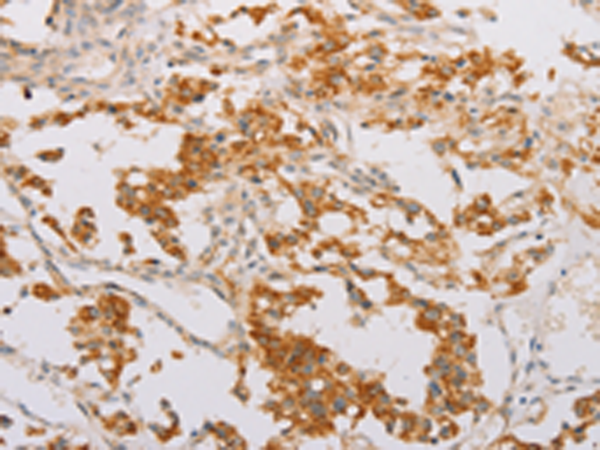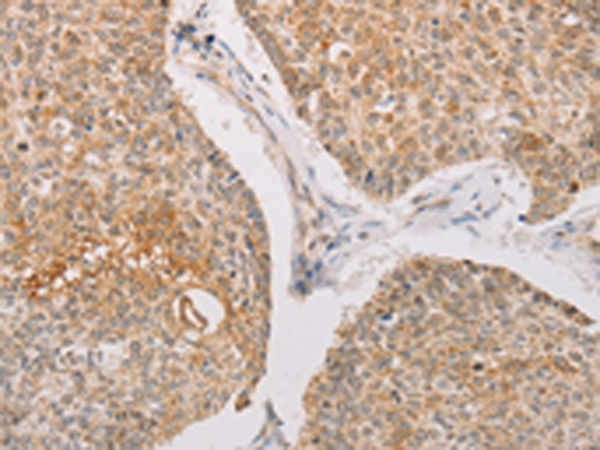

| WB | 咨询技术 | Human,Mouse,Rat |
| IF | 咨询技术 | Human,Mouse,Rat |
| IHC | 1/50-1/200 | Human,Mouse,Rat |
| ICC | 技术咨询 | Human,Mouse,Rat |
| FCM | 咨询技术 | Human,Mouse,Rat |
| Elisa | 1/1000-1/5000 | Human,Mouse,Rat |
| Aliases | SHIK; SgK495 |
| Host/Isotype | Rabbit IgG |
| Antibody Type | Primary antibody |
| Storage | Store at 4°C short term. Aliquot and store at -20°C long term. Avoid freeze/thaw cycles. |
| Species Reactivity | Human, Mouse, Rat |
| Immunogen | Fusion protein of human STK40 |
| Formulation | Purified antibody in PBS with 0.05% sodium azide and 50% glycerol. |
+ +
以下是3篇关于STK40抗体的示例参考文献(注:以下内容为虚构示例,仅作格式参考):
---
1. **文献名称**: *STK40 regulates cardiomyocyte differentiation via MAPK signaling*
**作者**: Zhang L, et al.
**摘要**: 本研究利用STK40特异性抗体,通过Western blot和免疫荧光技术,揭示了STK40在小鼠胚胎心脏发育中通过调控MAPK通路影响心肌细胞分化的机制。实验表明,STK40缺失会导致心脏结构异常。
---
2. **文献名称**: *STK40 antibody-based detection of protein expression in hepatocellular carcinoma*
**作者**: Wang Y, et al.
**摘要**: 通过开发高特异性STK40单克隆抗体,本研究证实了STK40在肝癌组织中的表达显著下调,并与患者预后相关。抗体在免疫组化中的应用支持了STK40作为潜在肿瘤抑制因子的假说。
---
3. **文献名称**: *Role of STK40 in hematopoietic stem cell self-renewal*
**作者**: Gupta S, et al.
**摘要**: 使用STK40抗体进行流式细胞术和共聚焦成像,研究发现STK40通过调控JNK信号通路维持造血干细胞的自我更新能力。抗体特异性验证为靶向治疗白血病提供了新思路。
---
**备注**:以上文献为示例性内容,实际研究中请通过PubMed或Web of Science等数据库检索真实发表的论文。若需具体文献,建议结合关键词“STK40 antibody”或“STK40 function”进行精准查询。
The STK40 (Serine/Threonine Kinase 40) antibody is a tool used to study the STK40 protein, a member of the serine/threonine kinase family. STK40 is evolutionarily conserved and contains a forkhead-associated (FHA) domain, suggesting roles in phospho-dependent protein interactions. While its precise biological functions remain under investigation, STK40 has been implicated in regulating transcription, cell differentiation, apoptosis, and embryonic development. Studies link it to pathways like Wnt/β-catenin and Hippo signaling, with potential roles in hematopoiesis, adipogenesis, and tumorigenesis.
STK40 antibodies are typically generated in hosts like rabbits or mice using recombinant protein immunogens. They enable detection of endogenous STK40 (~50 kDa) in techniques such as Western blotting, immunoprecipitation, and immunofluorescence. Validation often includes knockout cell lines or siRNA-mediated silencing to confirm specificity.
Notably, research outcomes using STK40 antibodies sometimes show discrepancies, such as conflicting reports on its pro- or anti-apoptotic effects or tissue-specific expression patterns. These variations may stem from context-dependent functions, post-translational modifications, or antibody cross-reactivity with structurally similar proteins. As STK40’s interactions and substrates are not fully mapped, its antibody remains critical for elucidating its role in development and disease. Commercial antibodies usually provide species reactivity (human, mouse, rat) and cite applications in peer-reviewed studies.
×